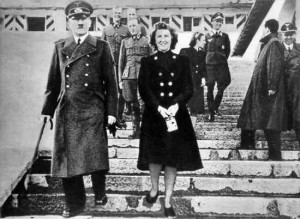
By Lev Navrozov
My column of Sept. 30, (“Hitler’s Tyranny Must Never Be Forgotten”) evoked an interest which prompts me to write a more analytic study of Hitler and his totalitarian rule of Germany in 1933 to 1945, when after his debacle in Russia, he committed suicide.
Before its totalitarian period, Germany had probably been the world’s most culturally creative country, be it music or philosophy or science or technology. And during the critical period for mankind, nuclear research in Germany was under way. At that time, however, Albert Einstein, a German physicist of genius, fled the country with his family.
Einstein sent four letters to President Franklin D. Roosevelt, informing him about the power of nuclear weapons developed in Hitler’s Germany and the necessity to speed up American nuclear program.

Hitler was appointed chancellor in 1933 and transformed his government into a de facto dictatorship. In August of 1934, Hitler became head of state. Thus, having merged the presidency with the chancellorship, Hitler consolidated and concentrated his political powers, which gave him absolute control over the state and the armed forces.
The invasion of Poland in 1939 led to the outbreak of World War II in Europe. Hitler’s racially motivated policies resulted in the deaths of as many as 17 million people, including an estimated six million Jews targeted in the Holocaust.
In 1900, at the age of 11, Hitler attended the Realschule in Linz. Hitler managed to complete only three years of the secondary school, having repeated two of the years twice. In 1904, at age 15, he attended the Realschule in Steyr, from which he was expelled in 1904 for disruptive behavior, and he never returned to school again. Hitler did badly in school, as is shown by his school records. “It is clear from early written work that he left school semi-literate.” His life gradually headed downhill to destitution. Hitler’s descent was eventually halted by entering the German army as a volunteer in 1914.
Hitler is an example of the unprincipled “professional politician” — not primarily an ideas man, but an opportunist who will “read the polls” and say whatever it takes to gain and stay in power.
From 1905, Hitler lived a bohemian life in the melting pot of Vienna. He was rejected twice by the Academy of Fine Arts in Vienna because of his “unfitness for painting,” and then again because he lacked the academic credentials required for architecture school.
In 1924, while at Landsberg Prison, where Hitler served a five-year sentence, after having been tried for high treason for leading the Beer Hall Putsch, Hitler dictated most of the first volume of Mein Kampf to his deputy Rudolf Hess … The book … was an autobiography and an exposition of his ideology. … Mein Kampf was published in two volumes in 1925 and 1926.
The book was anti-Semitic. But few noticed the book. However, Hitler continued its politically fashionable message: anti-Semitism, though the girl he had been in love with for four years, from the beginning of his 16th year, was Jewish, as were most of his friends and nearly all buyers of his postcards he made and painted.
But anti-Semitism was the most important message of the time, and Hitler would have presented it even if in his personal life he had a special love for Jews. His anti-Semitic efforts in “Mein Kampf” yielded the desired results in 1933 and 1934, when he was propelled to the highest offices in Germany.
There is no good evidence to support that Hitler showed any particular inclination to anti-Semitism until he became politically active. His claims to the contrary in Mein Kampf are probably false. Hitler writes: “There were very few Jews in Linz. In the course of centuries their outward appearance had become Europeanised … I even took them for Germans. The absurdity of this idea did not dawn on me because I saw no distinguishing feature but strange religion. The fact that they had, as I believed, been persecuted on this account sometimes turned my distaste at unfavorable remarks about them into horror. Thus far I did not so much as suspect the existence of an organized opposition to the Jews. Then I came to Vienna.
Hitler stated that he first became an anti-Semite in Vienna, with a large Jewish community, including Orthodox Jews who had fled the pogroms in Russia.
What was the cause of Hitler’s anti-Semitism? He discovered that anti-Semitism was for him the only workable tool to achieve his “political career,” that is, a way to a high social position and big money.
Hitler tried to exploit anti-Semitism in his “Mein Kampf.” He kept broadening its scale, and in 1933 he was sworn in as Chancellor of Germany, while in 1934 he became Germany’s president and promptly transformed his government into a de facto dictatorship.
In 1941, Hitler’s army invaded Russia. For many Germans, Russians were no better than Jews. Yet they defeated the German army, and Hitler committed suicide. Possibly he intended to destroy his brain, for surely that brain was destroying those miracles that Germans of genius had created.
Lev Navrozov can be reached by e-mail at [email protected].
